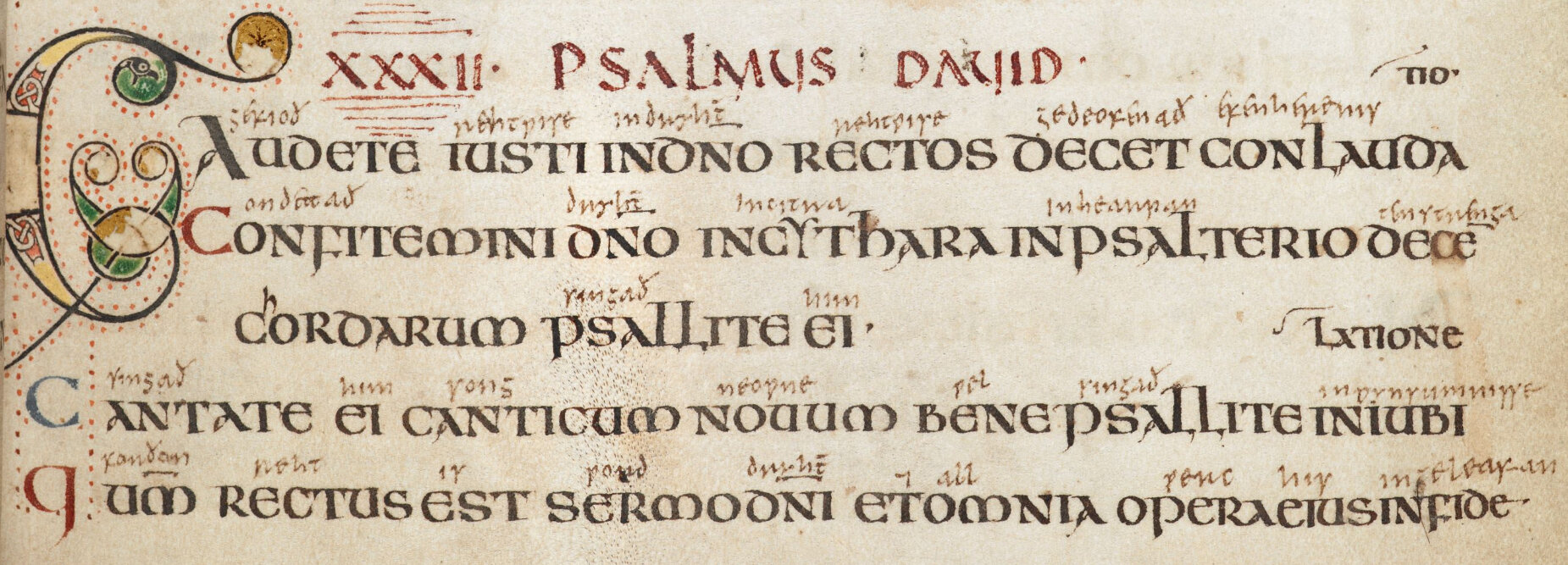9 June 2021
The words new and news have a very straightforward (and, frankly, boring) etymology. Normally, I wouldn’t bother with a word like this, but news has a long-standing false acronymic etymology that needs to be addressed.
The adjective new, characterizing something as not previously existing, traces back to the Old English neow. We can, for instance, see it in the Vespasian Psalter, a late eighth century Latin version of the book of Psalms with an early ninth century, interlinear Old English translation. The translation is in the Mercian dialect. From Psalm 32(33):3:
Cantate ei canticum nouum bene psallite in iubilatione
singað him song neowne wel singað in wynsumnisse
(sing him a new song, sing well in joyfulness)
The Old English adjective was also used as a substantive, eliding the noun it modified. We still see this usage today, as in the new and the old.
But use as a plural noun, news, meaning new things or novelties appears in the late fourteenth century, after the French nouvelles and/or the Latin novae, From a Wycliffite Bible, Ecclesiasticus 24:34–36, written sometime before 1382:
he sette to dauyd his child to reren vp a king of hym most strong: & in þe trone of worshipe sittinge in to euermore þe which fullfilleþ as phison wisdam: & as tigris in þe daiys of newis þat fulfilleþ as eufrates wit: þat multeplieþ as Jordan in þe tyme of rip
(He set David, his servant, to raise up a king of him most strong, and in the throne of worship sitting for evermore who fills wisdom as the Pishon, and as the Tigris in the days of news, who fills the Euphrates with that which produces as Jordan in the time of harvest.)
The Vulgate Latin uses novorum (of new [things]) in this passage.
And by the early fifteenth century, news was being used to mean tidings or reports. In these early uses it took plural agreement. From a 1417 letter to King Henry V:
RIGHTE excellente, righte gracious, and our righte redoubt and righte soveraiyne leige Lord, Wee doe recomend us unto your high royall Ma[jes]tie. soe humbly and obediently as any leige men may doe, in any manner, unto there soveraigne and redoubted leige Lord; especiallie, and above all other earthly thinges desiringe to heare and to knowe of the gracious prosperitie and noble health of your renowned person; the same beinge soe gracious and joyous newes as any can imagine or thinke to the principall comforte and especiall consolation of us and all your faythfull subjectes.
Now we come to the only interesting thing about the history of the word news. By the mid sixteenth century, it started taking singular agreement. A collection of tidings began to be treated as a singular entity. From a 1566 translation of Celio Secondo Curione’s Pasquine in a Traunce:
Thou sayest truth, for I hearde speak of it, whe[n] ye newes therof was brought to Pope Iulie the seconde, albeit this be also written in a faithfull story, and yet escaped they not vnpunished therefore, for foure of the[m] which were priuy to this, and other so great sacrileges were burnt aliue.
Hence, today we say the news is bad, not the news are bad.
That’s it. A pretty unremarkable history. But somewhere along the way, someone started spreading the idea that news was an acronym for north, south, east, and west, from the idea that tidings came from all directions. This is utter rot. Remember, anytime you hear someone suggest that word has an acronymic origin, treat the claim with suspicion. Very few words are newly coined via acronym (as opposed to coining a phrase that forms an acronym of an existing word; that is quite common).
Sources:
Curione, Celio Secondo. Pasquine in a Traunce: A Christian and Learned Dialogue. W.P., trans. London: William Seres, 1566, 36v.
Ellis, Henry, ed. “Letter 19. Letter to Kinge Henry Vth in Behalf of the Lord Furnyval Lord Lieutenant of Ireland” (1417). Original Letters, Illustrative of English History, second series, vol. 1 of 4. London: Harding and Lepard, 1827, 54–55. HathiTrust Digital Archive. London, British Library, Lansdowne MS 418, fol. 85.
Kuhn, Sherman M., ed. The Vespasian Psalter. Ann Arbor: U of Michigan Press, 28. HathiTrust Digital Archive. London, British Library, Cotton MS Vespasian A.1
Lindberg, Conrad, ed. MS. Bodley 959: Genesis–Baruch 3.20 in the Earlier Version of the Wycliffite Bible, vol. 4 of 8. Stockholm: Almquist & Wiksell, 1965, 337. HathiTrust Digital Archive. Oxford, Bodleian Library, MS Bodley 959.
Oxford English Dictionary, third edition, March 2021, s.v. new, adj. and n.; December 2020, s.v. news, n.
Image credit: London, British Library, Cotton MS Vespasian A.1, fol. 35r. Public domain as a mechanical reproduction of a work created before 1925.

